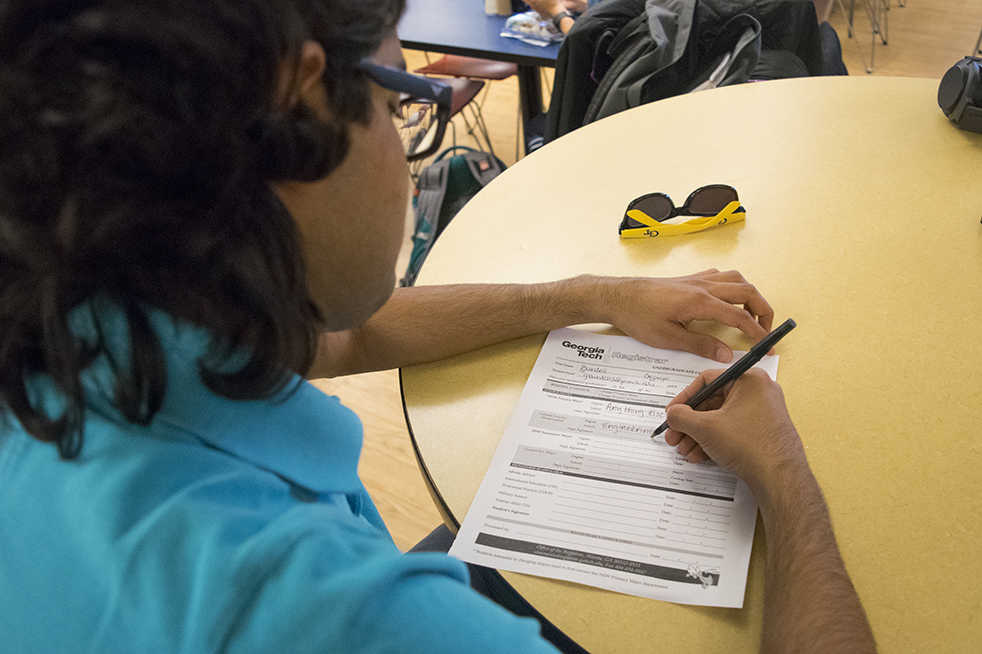Choosing a major is hard. It is a big choice that will influence the course of your life forever — or at least for a couple years until you change your major or graduate.
The most popular majors at Tech are of course within the College of Engineering. To get a better idea of the persistent popularity of engineering, the Technique spoke with several first-year engineering students.
“I chose ME because it was broad and I could apply it to a variety of careers,” said Clay Morrison, first-year ME. “I was originally quite indecisive about my major and was afraid of limiting my options, so the versatility of the ME major fit me perfectly … I remember listening to a spokesperson from the ME department during my COE freshman orientation class talking about how a lot of ME students at Georgia Tech end up going to medical school or law school afterwards, and that just really convinced me that anything is possible with an ME degree and that, by choosing ME, I would not be limiting my options at all.”
Phillip Holloway, first-year ME, had a simpler reason for his major choice: “Because I like it.”
Sometimes, choosing a major is as easy as knowing what you already know you are passionate about. In the case of Uttoreo Saha, first-year AE, he chose his major because he loves space.
“When I was really young, I witnessed a meteor shower and was both fascinated and mystified by it. I found myself thinking, ‘Woah, what is that,’ and I’ve been trying to get closer to space ever since. Learning about space, I realized the only major that really connected people to space was aerospace.
“I am using aerospace as my point of contact into the space world and industry, hoping I can one day make major contributions to research on outer space, maybe even falling into my childhood dream of being an astronaut.”
Saha offered advice for those who are still undecided.
“Enjoy the freedom you have now,” he said. “Once you choose and begin working down a track, you won’t really be able to explore other subjects. I wish I still had that leeway to explore, so make the most of trying things out while you still have the chance.”
Often, students come to Tech not knowing what they want to major in. Sarah Saltiel, fourth-year PUBP, shared how she ended up in her major.
“I was originally actually an industrial engineer. I switched to public policy though because I did not want to consult — that’s one of the major applications for an IE major — and I wasn’t really enjoying the content either, Saltiel said. “It’s really hard to be studying something if you’re disinterested, and my real interest had always been in educational reform, so it just made sense to choose public policy.”
She added on, “Don’t rush, [and] don’t feel pressured” into choosing a major without enough thought and conviction.
Isabel Jaffoni, first-year IE, also gave similar advice when it comes to choosing a major.
“Pick something you will like because Tech is already a tough school and it will only be harder if you are not enjoying what you are studying. I would take my first semester to feel out different types of courses, just to see how you feel about doing work in the subject.”
Having recently switched majors, Jaffoni spoke on what made her transition to Industrial Engineering from Math. “I chose my major because I was interested in it and I like to follow my interests like anyone else would,” she said. “Industrial Engineering sounded interesting and practical. It sounded like it involved a lot of the type of math I like too, so it was making itself a pretty appealing choice.”
The general theme is that your major should be based on previous background and interests. Tyler Cochran, first-year MT, was no exception.
“I have a strong background in music,” he said. “It’s my main interest that I’ve put a lot of time into, so it was natural to make it my major.”
When it comes to recommendations for undecided students who are unsure of what major to choose, Cochran said, “You have four years. Don’t be rash. Ask for help and advice from other people like professors and students.”
Caleb Rice, third-year BME, also has advice for undecided freshmen. “Make sure you talk to your upperclassmen, the ones from majors you’re interested in,” he said. “They’re the ones who bore the workload, survived the classes and know the professors. When you want to know which classes to take and which to avoid, upperclassmen are your go-to, so it would be the same for choosing a major. Ask around and see which majors have classes and workloads that interest and work for you. You might find out a major you thought was boring has some difficult but exciting labs with great professors. Even after choosing your major, getting to know and being able to ask upperclassmen questions is really important.”
Rice also had an interesting story for why he chose his major.
“I was born into a family of doctors, so I grew up being really interested in biology,” Rice explained. “Probably because I was surrounded by it so much. So I always knew I wanted to do something biology related. While I am not a pre-med student, my parents really wanted me to be. I was horrified by the idea though, because the pressure and responsibility that doctors were burdened with seemed like way too much for me. BME was a way for me to pursue my interest in biology that worked best for me.”
Even with personal interests, it takes time, testing and exploration to discover the right way to implement that into your college career. Self reflection is key to turning passion into life’s work, or at least a major right for you.
